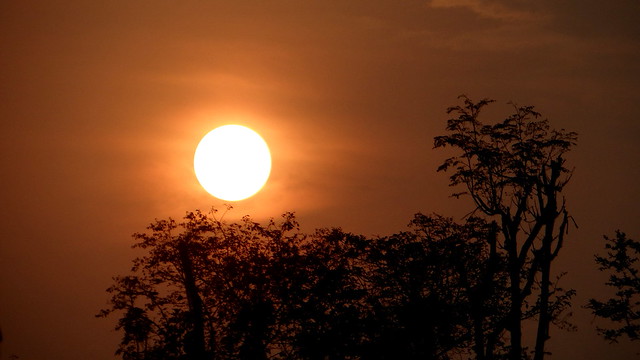Two kinds of birding...
May 14, 2014
The
is one of the favourite birding destinations in south Bangalore
On two days, I was privileged to do two different kinds of birding there.
One outing, on 110514, started at dawn:
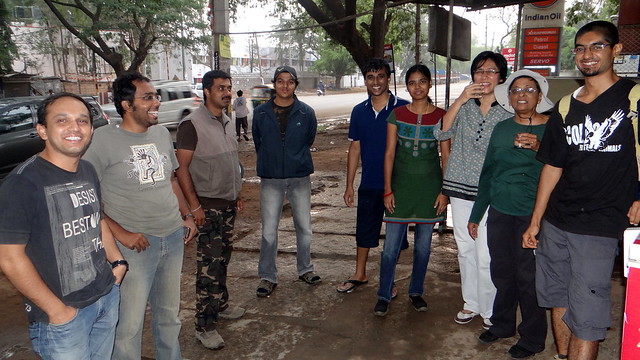 At the MCS, L to R: . Karuna, Janani, Siva, Varun, Aravind, Venkat, Ragini, Janhvi, yours truly, and Ganesh.
As more friends joined us at the Valley, and we met Swethadri and Kamal Hari, the group swelled to 15!
On this outing, we walked the trail, actively looking for birds, such as this
ROSE-RINGED PARAKEET
on the Silver Oak tree:
At the MCS, L to R: . Karuna, Janani, Siva, Varun, Aravind, Venkat, Ragini, Janhvi, yours truly, and Ganesh.
As more friends joined us at the Valley, and we met Swethadri and Kamal Hari, the group swelled to 15!
On this outing, we walked the trail, actively looking for birds, such as this
ROSE-RINGED PARAKEET
on the Silver Oak tree:
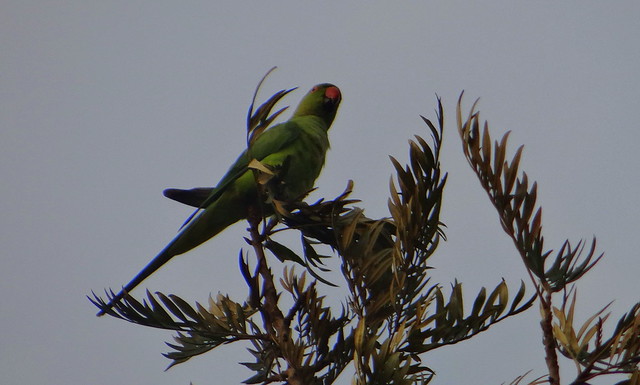 a
CRESTED SERPENT EAGLE:
a
CRESTED SERPENT EAGLE:
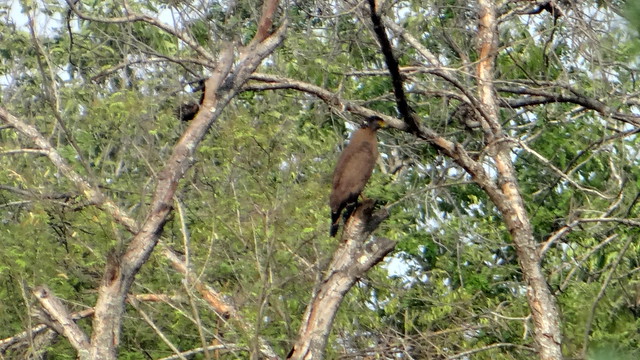 the
WHITE-RUMPED SHAMA:
the
WHITE-RUMPED SHAMA:
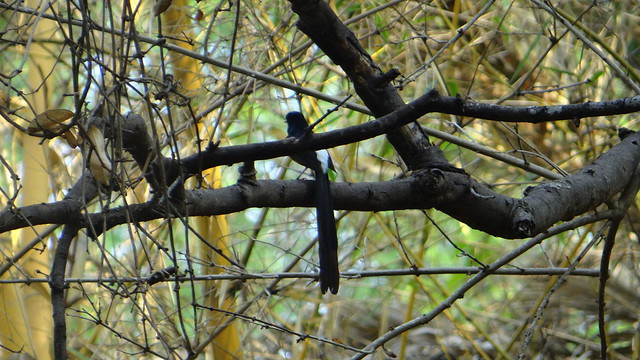 with many birds, we ended with this
HOOPOE
on the path:
with many birds, we ended with this
HOOPOE
on the path:
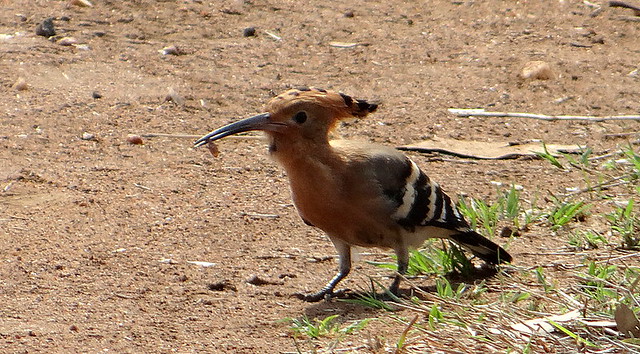 Of course, I like to see the trees and plants around, too. I could not id this tree:
Of course, I like to see the trees and plants around, too. I could not id this tree:
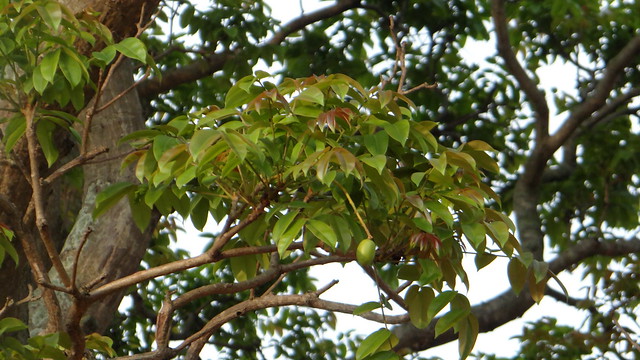 The beautiful trunk of a
TAMARIND:
The beautiful trunk of a
TAMARIND:
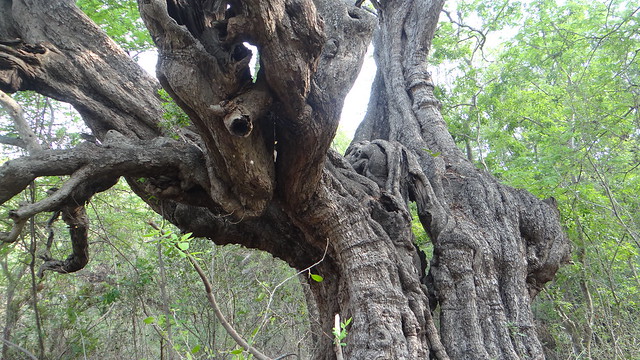 and its tiny flowers:
and its tiny flowers:
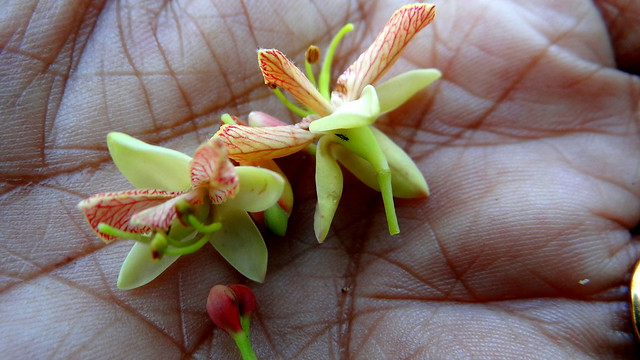 the beauty of the
GULMOHAR
under which I sat for a while:
the beauty of the
GULMOHAR
under which I sat for a while:
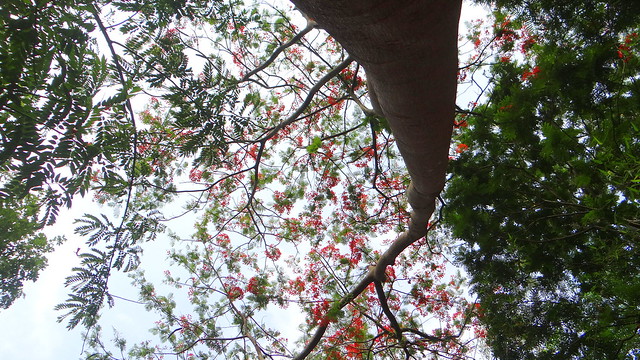 the petal of its flower:
the petal of its flower:
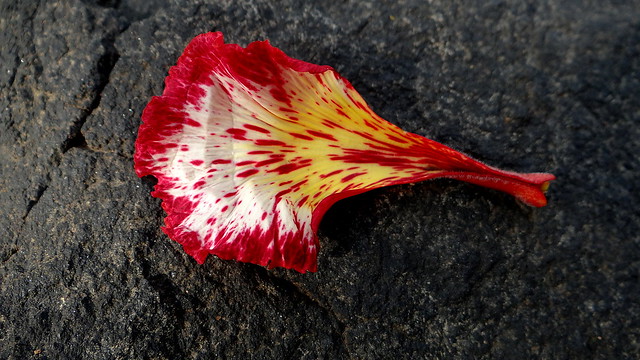 Photography was an active pursuit, too. I am not lying, but the photographer is!
Photography was an active pursuit, too. I am not lying, but the photographer is!
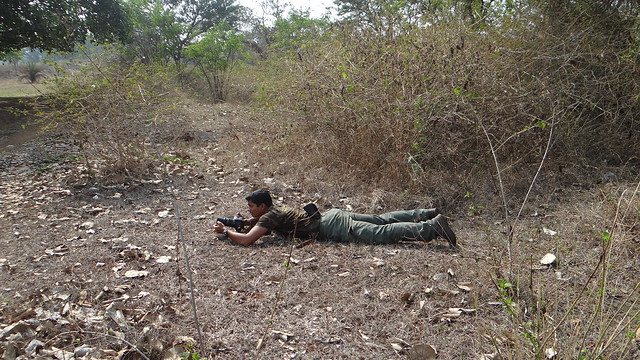 Ganesh is carefully documenting an insect...
Ganesh is carefully documenting an insect...
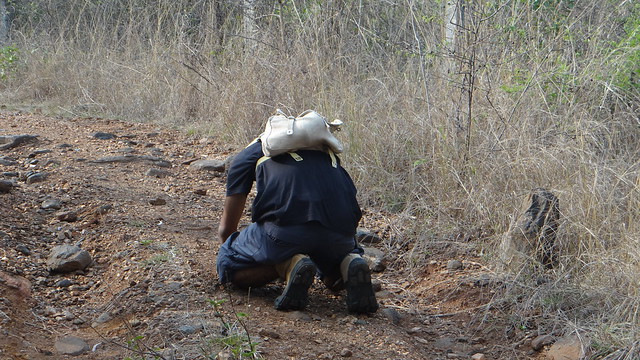 When one of us got a good shot, the others enjoyed it, too:
When one of us got a good shot, the others enjoyed it, too:
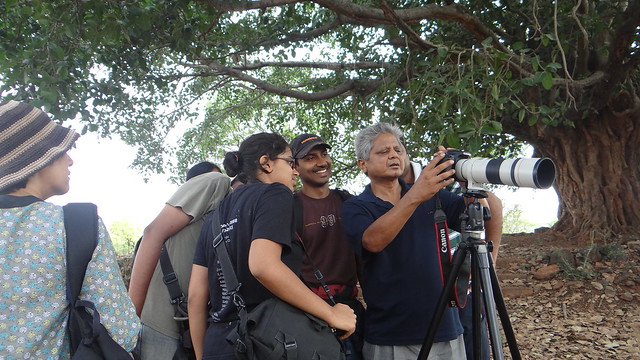 There were quite a few butterflies, and I clicked this
DANAID EGGFLY:
There were quite a few butterflies, and I clicked this
DANAID EGGFLY:
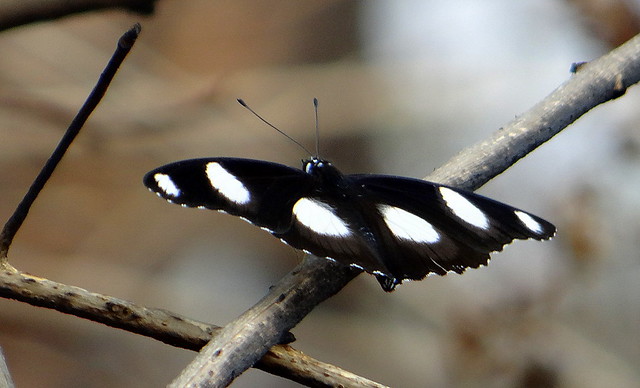 Some of us wound up with brefus at
Udupi Banashree
Some of us wound up with brefus at
Udupi Banashree
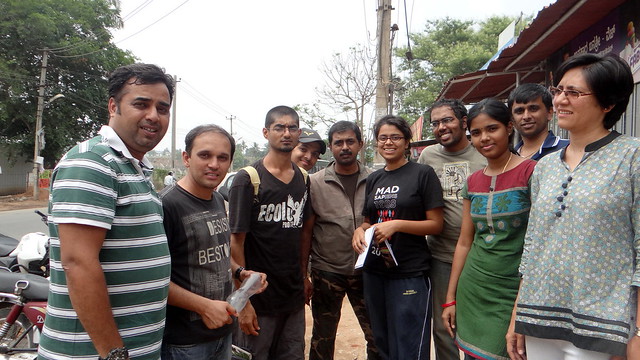 (Yashpal, extreme left, has joined us!)
This active seeking out of the birds is one kind of birding, and on this morning, we were very successful in our quest. We wandered over the bamboo thickets and liana areas, and a variety of bird sightings rewarded us.
On the 13th, it was just Rosita,
(Yashpal, extreme left, has joined us!)
This active seeking out of the birds is one kind of birding, and on this morning, we were very successful in our quest. We wandered over the bamboo thickets and liana areas, and a variety of bird sightings rewarded us.
On the 13th, it was just Rosita,
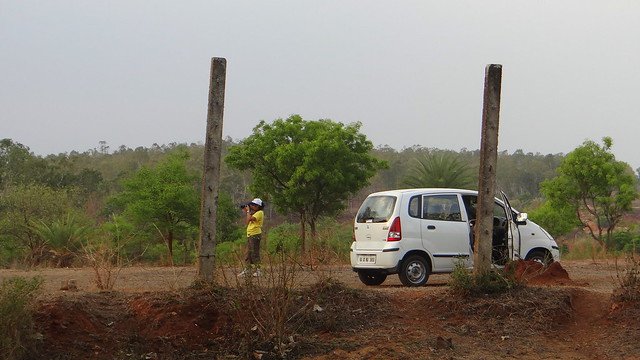 her son Mark, who's an excellent bird-spotter,
her son Mark, who's an excellent bird-spotter,
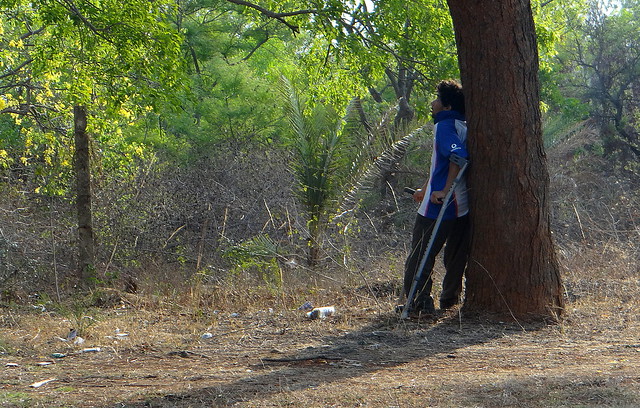 and me. This was in the late afternoon and evening...
and me. This was in the late afternoon and evening...
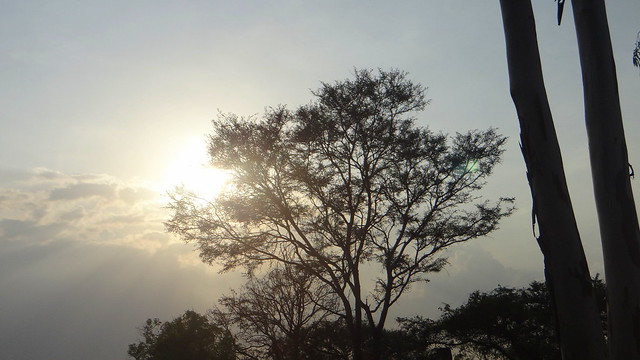 Once we reached the end of the path where the
ABANDONED HOUSE
Once we reached the end of the path where the
ABANDONED HOUSE
 (familiar to every birder, I would think, in south Bangalore...I'll make another blogpost about it. Thanks to Mark, I entered it and looked around for the first time in so many years!)
We just stayed there, not moving very much. The Banyan tree with the last of its figs was a kind of "bird Darshini (eatery)" for birds, so we just watched the birds in, and near, the majestic tree. Later, we walked around the abandoned house.
Mark didn't even take a minute to see the
SPOTTED OWLET:
(familiar to every birder, I would think, in south Bangalore...I'll make another blogpost about it. Thanks to Mark, I entered it and looked around for the first time in so many years!)
We just stayed there, not moving very much. The Banyan tree with the last of its figs was a kind of "bird Darshini (eatery)" for birds, so we just watched the birds in, and near, the majestic tree. Later, we walked around the abandoned house.
Mark didn't even take a minute to see the
SPOTTED OWLET:
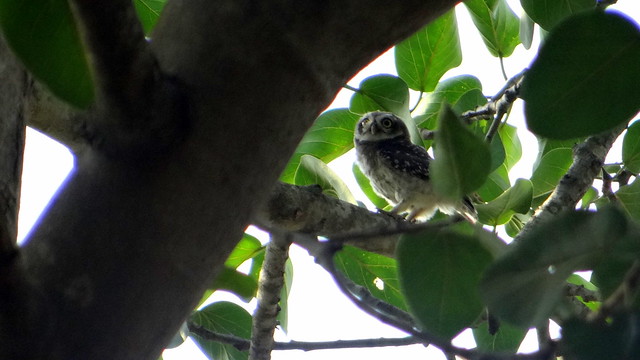
 The
JUNGLE BABBLERS
kept us company:
The
JUNGLE BABBLERS
kept us company:
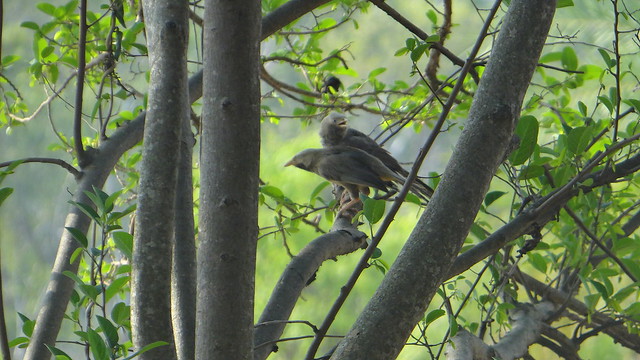 This
ASHY PRINIA
its cousin, the Plain Prinia, and the Common Tailorbird, hopped through the undergrowth:
This
ASHY PRINIA
its cousin, the Plain Prinia, and the Common Tailorbird, hopped through the undergrowth:
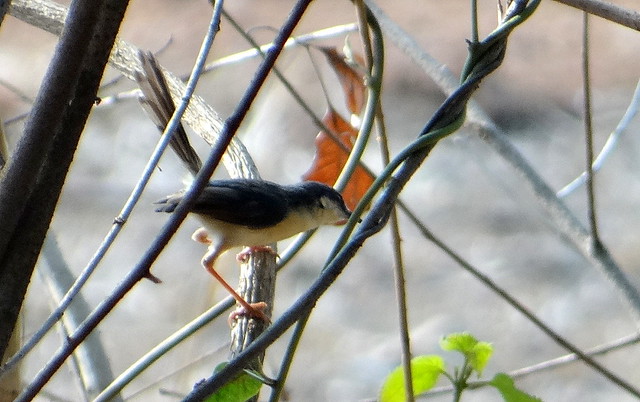 First one
LARGE CUCKOO-SHRIKE
First one
LARGE CUCKOO-SHRIKE
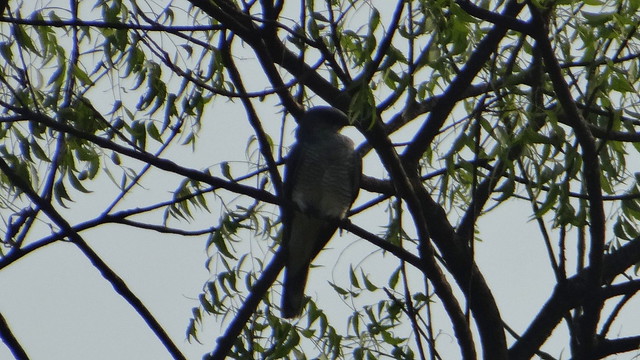 and then two, delighted us:
and then two, delighted us:
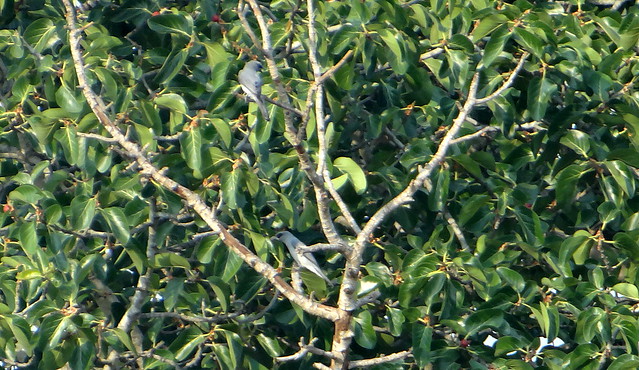 The
INDIAN LABURNUM
was in flower everywhere:
The
INDIAN LABURNUM
was in flower everywhere:
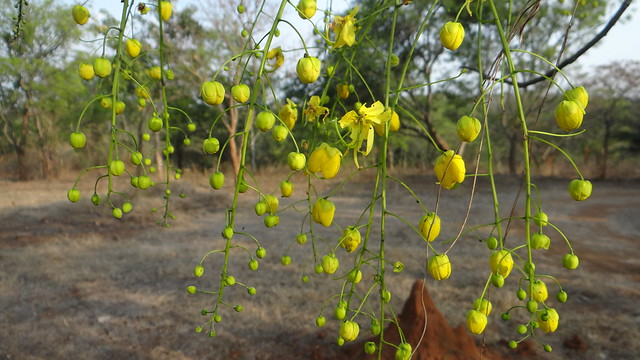 MISTLETOE
(Loranthus) grew on the nearby tree:
MISTLETOE
(Loranthus) grew on the nearby tree:
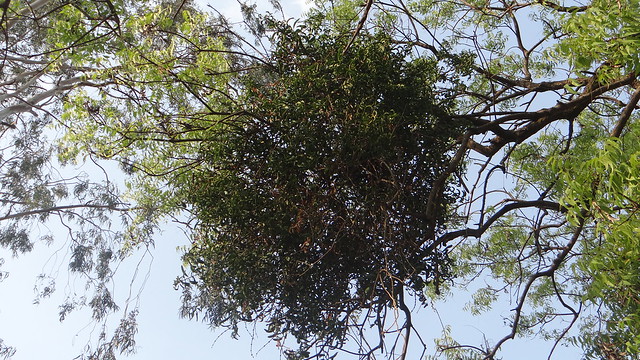 Looking carefully at the adventitious roots of the Banyan showed me
ANTS
farming the aphids:
Looking carefully at the adventitious roots of the Banyan showed me
ANTS
farming the aphids:
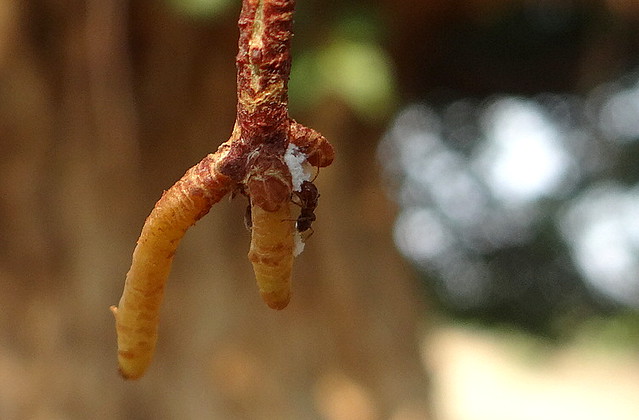 This
ROCK AGAMA
male, coming into his breeding colours, looked askance at me:
This
ROCK AGAMA
male, coming into his breeding colours, looked askance at me:
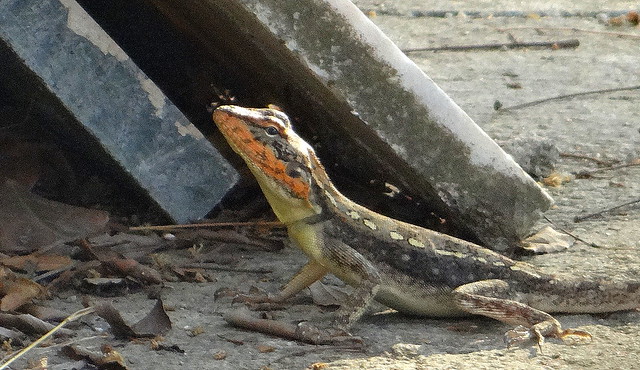 The difference between the two kinds of birding is very marked. One means active walking around, seeking the areas where some birds are likely to be. The other means staying in one place, passively content with whatever birds show themselves. But both are intensely satisfying.
A large group vs. a very small one also makes a big difference to what one sees. In one, the chances of sighting the birds actually increase, if everyone is a careful birder. But a smaller group can be just as good.
With both kind of birding, there is the happiness of learning from others, and being able to share a sighting...sometimes with everyone in the large group
In the "active walking" mode, it's looking for the birds; in the "passive waiting" mode, it's about watching the birds that do appear, and soaking in the whole atmosphere.
Morning birding and evening birding, too, have different kinds of light for photography (and sometimes even seeing the birds.)
You can click
here for the visit where 15 of us enjoyed the morning
and
here for the visit with Rosita and Mark
110514 bird list:
Babbler, Jungle
Babbler, Yellow-billed
Barbet, Coppersmith
Barbet, White-cheeked
Bee-eater, Blue-bearded
Bee-eater, Small Green
Bulbul, Red-vented
Bulbul, Red-whiskered
Bulbul, White-browed
Bushchat, Pied
Bushlark, Jerdon's
Buzzard, Oriental Honey
Coucal, Southern
Crow, House
Crow, Jungle
Cuckoo, Common Hawk (heard)
Cuckoo-shrike, Large
Dove, Laughing
Dove, Spotted
Drongo, Ashy
Drongo, Black
Eagle, Crested Serpent
Egret, Cattle
Egret, Little
Flameback, Black-rumped
Flowerpecker, Pale-billed
Flycatcher, Asian Paradise
Flycatcher, Tickell's Blue
Flycatcher, White-browed Fantail
Francolin, Grey (heard)
Iora, Common
Junglefowl, Grey (heard)
Kingfisher, White-breasted
Kite, Black
Kite, Brahminy
Koel, Asian
Lapwing, Red-wattled
Leafbird, Golden-fronted
Malkoha, Blue-faced
Minivet, Small
Myna, Common
Myna, Jungle
Oriole, Eurasian Golden
Parakeet, Rose-ringed
Peafowl, Indian (heard)
Pigeon, Blue Rock
Pipit, Paddyfield
Pitta, Indian
Prinia, Ashy
Prinia, Grey-breasted
Quail, un id
Robin, Indian
Robin, Oriental Magpie
Roller, Indian
Shama, White-rumped
Shrike, Long-tailed
Sunbird, Purple-rumped
Swallow, Red-rumped
Tailorbird, Common
Wagtail, White-browed
Warbler, Greenish
130514 bird list:
Babbler, Jungle
Babbler, Yellow-billed
Barbet, Coppersmith
Barbet, White-cheeked
Bee-eater, Blue-bearded
Bee-eater, Small Green
Bulbul, Red-vented
Bulbul, Red-whiskered
Bulbul, White-browed
Bushchat, Pied
Bushlark, Jerdon's
Buzzard, Oriental Honey
Coucal, Southern
Crow, House
Crow, Jungle
Cuckoo, Common Hawk (heard)
Cuckoo-shrike, Large
Dove, Laughing
Dove, Spotted
Drongo, Ashy
Drongo, Black
Eagle, Short-toed Snake
Egret, Cattle
Egret, Little
Flowerpecker, Pale-billed
Flycatcher, White-browed Fantail
Francolin, Grey (heard)
Junglefowl, Grey (heard)
Kingfisher, White-breasted
Kite, Black
Kite, Brahminy
Koel, Asian
Lapwing, Red-wattled
Leafbird, Golden-fronted
Malkoha, Blue-faced
Myna, Common
Myna, Jungle
Owl, Mottled Wood
Owlet, Spotted
Parakeet, Rose-ringed
Peafowl, Indian (heard)
Pigeon, Blue Rock
Pipit, Paddyfield
Prinia, Ashy
Robin, Indian
Robin, Oriental Magpie
Roller, Indian
Shrike, Long-tailed
Sunbird, Purple-rumped
Swallow, Red-rumped
Tailorbird, Common
The difference between the two kinds of birding is very marked. One means active walking around, seeking the areas where some birds are likely to be. The other means staying in one place, passively content with whatever birds show themselves. But both are intensely satisfying.
A large group vs. a very small one also makes a big difference to what one sees. In one, the chances of sighting the birds actually increase, if everyone is a careful birder. But a smaller group can be just as good.
With both kind of birding, there is the happiness of learning from others, and being able to share a sighting...sometimes with everyone in the large group
In the "active walking" mode, it's looking for the birds; in the "passive waiting" mode, it's about watching the birds that do appear, and soaking in the whole atmosphere.
Morning birding and evening birding, too, have different kinds of light for photography (and sometimes even seeing the birds.)
You can click
here for the visit where 15 of us enjoyed the morning
and
here for the visit with Rosita and Mark
110514 bird list:
Babbler, Jungle
Babbler, Yellow-billed
Barbet, Coppersmith
Barbet, White-cheeked
Bee-eater, Blue-bearded
Bee-eater, Small Green
Bulbul, Red-vented
Bulbul, Red-whiskered
Bulbul, White-browed
Bushchat, Pied
Bushlark, Jerdon's
Buzzard, Oriental Honey
Coucal, Southern
Crow, House
Crow, Jungle
Cuckoo, Common Hawk (heard)
Cuckoo-shrike, Large
Dove, Laughing
Dove, Spotted
Drongo, Ashy
Drongo, Black
Eagle, Crested Serpent
Egret, Cattle
Egret, Little
Flameback, Black-rumped
Flowerpecker, Pale-billed
Flycatcher, Asian Paradise
Flycatcher, Tickell's Blue
Flycatcher, White-browed Fantail
Francolin, Grey (heard)
Iora, Common
Junglefowl, Grey (heard)
Kingfisher, White-breasted
Kite, Black
Kite, Brahminy
Koel, Asian
Lapwing, Red-wattled
Leafbird, Golden-fronted
Malkoha, Blue-faced
Minivet, Small
Myna, Common
Myna, Jungle
Oriole, Eurasian Golden
Parakeet, Rose-ringed
Peafowl, Indian (heard)
Pigeon, Blue Rock
Pipit, Paddyfield
Pitta, Indian
Prinia, Ashy
Prinia, Grey-breasted
Quail, un id
Robin, Indian
Robin, Oriental Magpie
Roller, Indian
Shama, White-rumped
Shrike, Long-tailed
Sunbird, Purple-rumped
Swallow, Red-rumped
Tailorbird, Common
Wagtail, White-browed
Warbler, Greenish
130514 bird list:
Babbler, Jungle
Babbler, Yellow-billed
Barbet, Coppersmith
Barbet, White-cheeked
Bee-eater, Blue-bearded
Bee-eater, Small Green
Bulbul, Red-vented
Bulbul, Red-whiskered
Bulbul, White-browed
Bushchat, Pied
Bushlark, Jerdon's
Buzzard, Oriental Honey
Coucal, Southern
Crow, House
Crow, Jungle
Cuckoo, Common Hawk (heard)
Cuckoo-shrike, Large
Dove, Laughing
Dove, Spotted
Drongo, Ashy
Drongo, Black
Eagle, Short-toed Snake
Egret, Cattle
Egret, Little
Flowerpecker, Pale-billed
Flycatcher, White-browed Fantail
Francolin, Grey (heard)
Junglefowl, Grey (heard)
Kingfisher, White-breasted
Kite, Black
Kite, Brahminy
Koel, Asian
Lapwing, Red-wattled
Leafbird, Golden-fronted
Malkoha, Blue-faced
Myna, Common
Myna, Jungle
Owl, Mottled Wood
Owlet, Spotted
Parakeet, Rose-ringed
Peafowl, Indian (heard)
Pigeon, Blue Rock
Pipit, Paddyfield
Prinia, Ashy
Robin, Indian
Robin, Oriental Magpie
Roller, Indian
Shrike, Long-tailed
Sunbird, Purple-rumped
Swallow, Red-rumped
Tailorbird, Common


